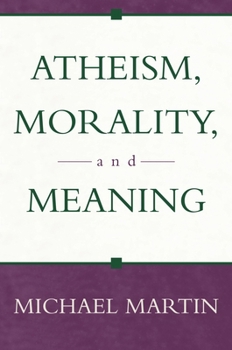Atheism, Morality, and Meaning
Select Format
Select Condition 
Book Overview
Despite the pluralism of contemporary American culture, the Judaeo-Christian legacy still has a great deal of influence on the popular imagination. Thus it is not surprising that in this context atheism has a slightly scandalous ring, and unbelief is often associated with lack of morality and a meaningless existence. Distinguished philosopher and committed atheist Michael Martin sets out to refute this notion in this thorough defense of atheism as a both moral and meaningful philosophy of life. Martin shows not only that objective morality and a meaningful life are possible without belief in God but that the predominantly Christian world view of American society is seriously flawed as the basis of morality and meaning.Divided into four parts, this cogent and tightly argued treatise begins with well-known criticisms of nonreligious ethics and then develops an atheistic meta-ethics. In Part 2, Martin criticizes the Christian foundation of ethics, specifically the Divine Command Theory and the idea of imitating the life of Jesus as the basis of Christian morality. Part 3 demonstrates that life can be meaningful in the absence of religious belief. Part 4 criticizes the theistic point of view in general terms as well as the specific Christian doctrines of the Atonement, Salvation, and the Resurrection.This highly informed and sophisticated defense of atheism is a stimulating challenge to religious believers and a serious contribution to ethical theory.
Format:Paperback
Language:English
ISBN:1573929875
ISBN13:9781573929875
Release Date:January 2003
Publisher:Prometheus Books
Length:330 Pages
Weight:1.02 lbs.
Dimensions:0.7" x 6.0" x 8.9"
Customer Reviews
2 ratings
Welcome addition to literature on religion & morality
Published by Thriftbooks.com User , 21 years ago
Most of the recent literature on the relationship between religion and morality is written by theists. It is rare to find anything in print by an atheist on *contemporary* moral arguments for God's existence. It is even less common to find an atheist who discusses such arguments without denying moral realism or moral objectivism. Michael Martin's book is a welcome exception to this trend. Martin responds to moral arguments for God's existence *as a moral realist and as a moral objectivist*. Martin does not just defend atheism against moral apologetics; he goes on the offensive, presenting an affirmative case for an atheistic moral realism. He also makes many interesting points about the idea that Christianity (and not just God in general) is the foundation of ethics, and offers a detailed discussion of the implications of Christianity and naturalism for the meaning of life. The breadth of the territory covered by Martin is impressive; I know of no other book on the market that covers such a variety of metaethical issues from an atheistic perspective. Anyone interested in the relationship between naturalism, theism, and morality will find Martin's book useful. Moreover, unlike many books on metaethics, Martin's book is not highly technical, which helps to make it accessible to the lay reader.However, the book does have its limitations. Many nonphilosophers will find Martin's presentation and defense of Ideal Observer Theory counterintuitive and unconvincing. Martin says nothing about the atheistic justification for adopting the moral point of view. And Martin says little or nothing about some of the influential moral arguments advanced by theists. For example, he says nothing about Robert Adams's work on the social nature of obligation and very little about George Mavrodes's argument about the "queerness of morality." In this sense, Martin's discussion is incomplete.Nevertheless, despite these shortcomings, this book would make a useful addition to the library of anyone interested in the relationship between atheism and morality.
A sustained case well argued
Published by Thriftbooks.com User , 21 years ago
Martin undermines the Christian case for morality and meaning in life, and he also shows how an atheistic view can support an ethical theory and a meaningful life. Martin's sustained case for showing how life can have meaning without god, and how objective morality is possible without god, is must reading for both atheists and believers--especially the believers, since they often suffer from the mistaken stereotype that belief in god is a necessary condition for both ethics and meaning in life. One may, perhaps, fault Martin for not devoting much space to alternative atheistic ethical theories other than the one he develops in the book, but details on those theories are readily available elsewhere, and Martin's book suffers from few other shortcomings. (Although, unfortunately, he does devote some space to refuting the absurd presuppositionalist claims of Bahnsen, a view that is not taken seriously in contemporary ethical theory anyway. But I guess someone has to refute it.) This book should be on the shelf of anyone interested in the relationship between theism, morality, and meaning in life. Readable, informative, accurate, and powerful. Buy it.






